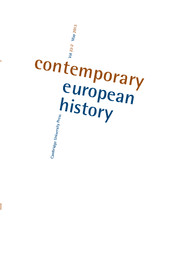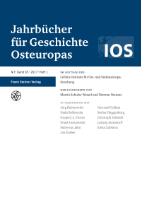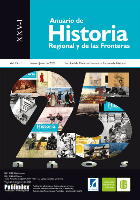
Antiteses
Scope & Guideline
Empowering Research with Unrestricted Access
Introduction
Aims and Scopes
- Interdisciplinary Historical Research:
The journal publishes research that spans various disciplines, including history, literature, sociology, and cultural studies, allowing for a multifaceted exploration of historical phenomena. - Focus on the Global South:
Antiteses emphasizes the historical narratives and cultural expressions from the Global South, particularly Latin America, offering critical insights into social, political, and cultural histories that are often underrepresented in mainstream scholarship. - Cultural Memory and Representation:
The journal explores themes of memory, identity, and representation, particularly in relation to colonial histories, social movements, and cultural production, contributing to discussions on how history is remembered and represented in contemporary society. - Decolonial Perspectives:
Antiteses actively engages with decolonial thought, challenging dominant historical narratives and advocating for the inclusion of marginalized voices and perspectives in the understanding of history. - Socio-Cultural Dynamics:
The journal examines the interplay of cultural practices, social structures, and political movements, focusing on how these dynamics shape identities and historical experiences.
Trending and Emerging
- Decolonial Studies:
An increasing number of publications engage with decolonial frameworks, emphasizing the need to reassess colonial histories and their legacies while advocating for the inclusion of indigenous and marginalized voices. - Environmental History and Ecology:
Recent papers explore the intersection of history and environmental studies, focusing on ecological issues, sustainability, and the historical impact of human activity on natural landscapes, reflecting a growing awareness of climate change and environmental justice. - Cultural Memory and Trauma:
There is a rising interest in the themes of cultural memory, trauma, and reconciliation, particularly in the context of post-colonial societies, as scholars examine how societies remember and narrate their pasts. - Globalization and Transnational Histories:
The journal increasingly features research that addresses globalization and transnational connections, examining how historical processes shape contemporary cultural and social dynamics across borders. - Intersectionality in Historical Narratives:
Emerging scholarship emphasizes intersectionality, exploring how various identities (such as race, gender, and class) interact within historical contexts, thus enriching the analysis of social movements and cultural production.
Declining or Waning
- Traditional Eurocentric Histories:
There is a noticeable decline in the publication of papers that focus solely on traditional Eurocentric historical narratives, as the journal increasingly prioritizes perspectives that challenge these dominant frameworks. - Narrowly Defined National Histories:
Research focusing exclusively on narrowly defined national histories without a broader cultural or global context appears less frequently, reflecting a shift towards more interconnected and comparative historical analyses. - Static Theoretical Frameworks:
Papers relying on static or outdated theoretical frameworks are less prevalent, as the journal encourages the adoption of innovative and interdisciplinary approaches to historical inquiry. - Limited Focus on Military History:
There has been a decrease in publications dedicated solely to military history, suggesting a move towards exploring more diverse and nuanced social and cultural histories. - Reduction in Traditional Archival Research:
While archival research remains important, there is a trend of diminishing focus on traditional archival methods in favor of interdisciplinary approaches that incorporate oral histories and cultural artifacts.
Similar Journals

Contemporanea
Illuminating the Pathways of Contemporary ScholarshipContemporanea is a distinguished academic journal dedicated to the exploration of contemporary history, published by SOC ED IL MULINO in Italy. Since its inception in 1999, this journal has served as a vital platform for scholars and researchers seeking to delve into the complex narratives that shape our modern world. With its ISSN 1127-3070 and E-ISSN 1127-3070, Contemporanea is indexed in Scopus, currently categorized in the third quartile (Q3) of the History category, ranking at #1012 out of 1760 and situated in the 42nd percentile, signifying its relevancy within the field. This journal not only promotes rigorous research but also fosters scholarly dialogue that transcends traditional boundaries. Researchers and students alike will find a treasure trove of articles that cover diverse themes, ensuring a comprehensive understanding of contemporary historical issues. While access options are not open, contributors and readers are encouraged to engage with the wealth of knowledge presented within its pages, contributing to the journal’s objective of advancing academic scholarship.

Anos 90
Unearthing Historical Narratives from a Pivotal Decade.Anos 90 is a distinguished journal dedicated to the exploration of historical narratives and cultural phenomena, particularly within the context of Brazil during the tumultuous decade of the 1990s. Published by the Universidade Federal do Rio Grande do Sul as part of its Programa de Pós-Graduação em História, this open access journal has been a vital platform for scholars since 1993, encouraging the dissemination and discussion of historical research that contributes to the understanding of contemporary societal evolution. With an ISSN of 1983-201X and an E-ISSN of 0104-236X, the journal is committed to providing accessible scholarly content to a global audience, thus fostering collaborative research opportunities and academic dialogue. Despite being ranked in the fourth quartile for the History category as of 2023, Anos 90 remains an essential resource for researchers and students seeking in-depth insights into historical interpretation and analysis. The journal serves as a critical juncture for the academic community interested in delving into the complexities of a pivotal era in Brazilian history, making it a significant addition to the field of historical study.

Contemporary European History
Exploring the Threads of Modern European NarrativesContemporary European History is a leading academic journal dedicated to the exploration of significant historical events across Europe from 1992 to the present, published by Cambridge University Press. As a Q1 rated journal in the field of History, it boasts a robust impact factor, reflecting its high citation frequency and prominence among scholars. The journal serves as an essential platform for researchers, professionals, and students interested in contemporary issues and trends affecting Europe, promoting interdisciplinary dialogue and the exchange of ideas. With its commitment to high-quality scholarship, Contemporary European History provides insightful analyses that shape our understanding of recent historical dynamics, making it a vital resource for anyone looking to delve into the complexities of modern European history.

Journal of Belgian History-Revue Belge d Histoire Contemporaine-Belgisch Tijdschrift voor Nieuwste Geschiedenis
Fostering Insight into Belgium's Modern HistoryThe Journal of Belgian History-Revue Belge d'Histoire Contemporaine-Belgisch Tijdschrift voor Nieuwste Geschiedenis is a prominent academic publication dedicated to the exploration and analysis of contemporary Belgian history. Published by SOMA-CEGES, this journal serves as a vital resource for researchers, professionals, and students alike, providing a platform for scholarly discourse and the dissemination of innovative research in the field. Despite its historical significance, the journal faced a hiatus in its Scopus coverage from 2019, yet it retains a strong identity within the Arts and Humanities category, holding a Scopus rank of #1123 out of 1328, placing it in the 15th percentile. This underscores the opportunities for growth and impactful contributions within the journal's scope. By focusing on the intricacies of Belgian history, the journal encourages rigorous investigation and a deeper understanding of Belgium's past, making it an essential reference for anyone interested in European historical narratives.

Anuario IEHS
Exploring the forefront of social science research.Anuario IEHS is a prestigious open-access journal dedicated to the field of social sciences, published by the Universidad Nacional del Centro de la Provincia de Buenos Aires (UNICEN). Since its transition to open access in 2016, the journal has aimed to foster scholarly communication and accessibility, ensuring that cutting-edge research is freely available to all stakeholders in academia. Housed within the Faculty of Social Sciences, Anuario IEHS serves as a vital platform for researchers, professionals, and students who seek to engage with current societal issues and interdisciplinary scholarship. Reflecting the dynamic nature of social sciences, the journal publishes a variety of articles that contribute to the understanding of social phenomena, ensuring its relevance and impact in the academic community. With its commitment to quality and accessibility, Anuario IEHS continues to be a significant resource for those dedicated to advancing research and practices within the social sciences.

JAHRBUCHER FUR GESCHICHTE OSTEUROPAS
Enriching Understanding of Eastern Europe's Cultural ChroniclesJAHRBUCHER FUR GESCHICHTE OSTEUROPAS, published by FRANZ STEINER VERLAG GMBH, is a prominent academic journal dedicated to the exploration of Eastern European history. With its inception dating back to 1978, this journal has consistently provided a platform for scholarly discourse, contributing significantly to the understanding of the region's complex historical narratives. While the journal is not open access, it holds a solid reputation within the academic community, positioned in the Q4 quartile in history as per the 2023 category rankings, and stands at Rank #1636 within the Scopus Arts and Humanities History ranking. The convergence of its publication years throughout the decades emphasizes a long-standing commitment to historical research, thereby making it an essential resource for researchers, professionals, and students interested in Eastern European studies. Explore the intricate dynamics of historical events and cultural developments that shape Eastern Europe through this invaluable periodical.

Culture & History Digital Journal
Bridging Cultures and Histories through Open Access Scholarship.Culture & History Digital Journal, published by CONSEJO SUPERIOR INVESTIGACIONES CIENTIFICAS-CSIC, is a distinguished Open Access journal dedicated to advancing the study of cultural phenomena and historical narratives. Recognized for its scholarly contributions, this journal boasts an impressive ranking within the Q2 category of both Cultural Studies and History for 2023, further supplemented by its notable standings in Scopus, where it ranks #533 out of 1760 in Arts and Humanities (History) and #544 out of 1304 in Social Sciences (Cultural Studies), reflecting its commitment to high-quality research dissemination. The journal has been embracing Open Access since 2012, making a wide array of interdisciplinary content freely available to researchers, professionals, and students worldwide. With a focus on promoting innovative scholarship and critical analysis within the digital humanities landscape, Culture & History Digital Journal serves as an essential platform for those engaged in the exploration of the interplay between culture and history in the contemporary context.

Anuario de Historia Regional y de las Fronteras
Exploring the Tapestry of Regional Histories and BordersAnuario de Historia Regional y de las Fronteras is a distinguished academic journal published by UNIV INDUSTRIAL SANTANDER, focusing on the multifaceted intersections of regional history and border studies. With an ISSN of 0122-2066 and E-ISSN of 2145-8499, this Open Access journal has been at the forefront of scholarly discourse since 1995, providing researchers, professionals, and students with a platform for disseminating rigorous historical research and analysis. The journal aims to enhance understanding of regional dynamics and the socio-political implications of borders, fostering interdisciplinary dialogue and critical insights into historical narratives. Based in Bucaramanga, Colombia, the journal plays a vital role in promoting Latin American perspectives and enriching global historiography. As it endeavors to impact the field significantly, Anuario de Historia Regional y de las Fronteras invites contributions from scholars worldwide who share a passion for exploring the complexities of regional histories and borders.

Revista de Historia-Sao Paulo
Illuminating the Past, Inspiring Future Inquiry.Revista de Historia-Sao Paulo, an esteemed academic journal published by UNIV SAO PAULO, FAC FILOSOFIA LETRAS & CIENCIAS HUMANAS, has been a key platform for historical research since its inception in 1950, offering open access to a diverse array of scholarly articles. Based in Brazil, this journal delivers a critical perspective on historical studies, contributing to the broader discourse within the field. With an ISSN of 0034-8309 and an E-ISSN of 2316-9141, it has established a notable presence in academia, ranking within the Q2 quartile for its contributions to history as of 2023. The journal's impact is underscored by its inclusion in Scopus, with a rank of 1103/1760 in the Arts and Humanities category. Covering converged years that span from 1968 to 2024, the journal caters to a wide scholarly community and facilitates the dissemination of pioneering research. Its commitment to making historical resources accessible accentuates its relevance and importance to researchers, professionals, and students alike.

Historia e Cultura
Innovating Historical Discourse for a Global AudienceHistoria e Cultura is a distinguished open-access journal focusing on the dynamic and multifaceted exploration of history and culture within the context of the Humanities. Published by the UNIV ESTADUAL PAULISTA JULIO MESQUITA FILHO, FAC CIENCIAS HUMANAS & SOCIAIS, the journal serves as a vital resource for researchers, professionals, and students engaged in the fields of historical research and cultural studies. Since transitioning to open access in 2012, Historia e Cultura aims to democratize knowledge by providing free, unrestricted access to high-quality articles that foster scholarly exchange and innovation. Although the specific impact factor remains undisclosed, the journal is dedicated to contributing to the academic discourse through rigorous peer-reviewed research. Situated in Brazil, Historia e Cultura is well-positioned to address both local and global issues, encouraging critical engagement with cultural heritage and identity. Researchers and scholars are invited to submit their work, ensuring that diverse perspectives are represented in the study of our shared history.